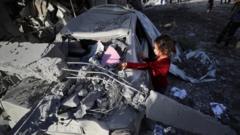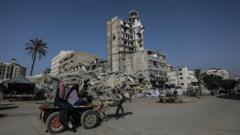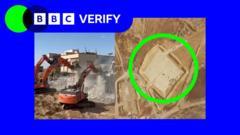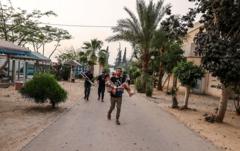In the aftermath of a year-long war between Israel and Hezbollah, Lebanon faces an enormous challenge in clearing the extensive damage left behind, which threatens to overwhelm the environment.
Lebanon's Massive Clean-Up Effort in the Wake of Conflict

Lebanon's Massive Clean-Up Effort in the Wake of Conflict
As ceasefires hold, Lebanon grapples with the daunting task of debris removal post-war.
For three months, Ahmad Mehdi has been adapting to life in a damaged apartment in a neighborhood south of Beirut following an Israeli airstrike that devastated the building next door. "Eleven floors worth of rubble have collapsed into two," he laments, observing the remnants of destruction. Like many affected families in Lebanon, he is eager to start repairs but feels stymied by the issue of debris disposal. "That is our biggest problem: Where do we put the debris?" he questions, echoing the concerns of many.
As Lebanon enters a tentative rebuilding phase after a cease-fire between Hezbollah and Israel, the nation is tasked with tackling the staggering volume of rubble now littering Beirut. According to a report from the National Council for Scientific Research in Lebanon, initial assessments estimate that close to 3,000 buildings in the Dahiya area south of Beirut have been destroyed or heavily damaged during the conflict. The war has claimed over 3,700 lives and displaced approximately 1.3 million people.
Tamara Elzein, one of the report's authors, states that Israeli attacks have generated roughly 350 million cubic feet of debris, complicating reconstruction efforts which cannot commence until significant clearing is completed. Concurrently, Gaza has endured its own destruction, with nearly 60 percent of structures affected as the conflict continues, alongside damage from Hezbollah's rocket attacks in Israel, which have led to home destruction and forest fires in agricultural regions.
The enormity of this clean-up effort is becoming a focal point in Lebanon's path to recovery, underscoring the urgent need to find effective solutions for managing the conflict's harsh environmental legacy.






















